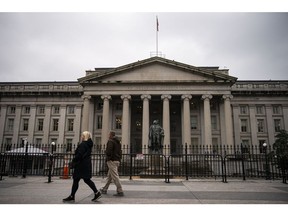US Treasury Is the Latest Victim of a ‘Persistent’ Multiple Hacking Threat
A growing list of political scientists, US government agencies and companies that provide critical services have one thing in common: They are suspected of being hacked by China.

Article content
(Bloomberg) — A growing list of political scientists, U.S. government agencies and companies that provide critical services have one thing in common: They are suspected of being hacked by China.
Article content
Article content
The latest victim is the US Treasury Department, which disclosed on Monday that Chinese state-sponsored hackers breached its network through a third-party provider, accessing some anonymous documents.
Advertisement 2
Article content
While the details of the hack are still sketchy, cyber security experts say it confirms what US intelligence officials warned earlier this year, that China is “an active and persistent cyber threat to US government, private sector and critical infrastructure sites.”
“The Russians are getting a lot of attention because of the use of disruptive cyber attacks,” said Adam Segal, director of the Council on Foreign Relations’ Digital and Cyberspace Policy Program, referring to the Russian-linked hacking of the largest US oil pipeline as well. satellite network in Ukraine. “But the Chinese are a long-term threat because of their technology and the scope and scale of their operations.”
Chinese officials have long denied US allegations of state-sponsored cyber attacks, and a Chinese Foreign Ministry spokesman called the allegations behind the Treasury hack “unprovoked and baseless.”
“China opposes all forms of hacking, and in particular, we oppose the spread of disinformation related to China motivated by a political agenda,” spokesman Mao Ning told reporters during a news conference in Beijing.
Article content
Advertisement 3
Article content
US officials, however, have been more vocal in their criticism of China’s threats and vowed to retaliate.
A few days before the Treasury hack was announced, a White House official said the US had identified a ninth telecommunications company affected by a major espionage operation suspected in China. Not all victims have been publicly identified but AT&T Inc. and Verizon Communications Inc. they admitted to being hit as part of an espionage operation.
Hackers accessed the communications of a “limited number” of government and political figures including presidential candidate Donald Trump, his former running mate Senator JD Vance and Vice President Kamala Harris’ campaign staff.
China was also accused in 2023 of hacking the email accounts of key government officials including Commerce Secretary Gina Raimondo and, according to the Wall Street Journal, US Ambassador to China Nicholas Burns.
“It’s still one of the worst problems in this relationship,” Burns said in an interview with Bloomberg News earlier this month, adding that Chinese officials echo their public statements in closed-door meetings. “They deny that there is any Chinese cyber abuse going on, and that is absolutely not the case.”
Advertisement 4
Article content
Cui Hongjian, a former Chinese diplomat who teaches at Beijing Foreign Studies University, said the alleged hacking between the US and China shows a lack of trust. “From China’s point of view, the US accuses China repeatedly and deliberately ‘smears’ China’s image,” he said.
“Although both sides consider the importance of cybersecurity and see the other as a major threat, cyber attacks are more like a ‘scrub’ risk than a car collision in some policy areas, such as Taiwan, so the situation is still under control,” he said. .
Cybersecurity experts disagree on whether the frequency of Chinese hacking has increased in recent years, or if more are being discovered and publicly acknowledged.
But many agree that China’s Internet power has grown significantly and that its focus has shifted.
About a decade ago, for example, Chinese state-sponsored hackers stole personal data from millions of government employees at the U.S. Office of Personnel Management, according to authorities. China has also been accused of hacking Equifax, Marriott hotels and health insurance company Anthem to gather vast amounts of data on Americans — data with economic and intelligence value that “could feed China’s development of artificial intelligence tools,” US Attorney General William Barr said. in 2020.
Advertisement 5
Article content
US officials have also accused China of stealing intellectual property from US companies in agriculture, biotech, health care, aerospace, robotics and semiconductors, some of them through cyberattacks.
Recently, US officials have warned that Chinese hackers are trying to penetrate the networks of companies that serve important parts of the economy, leaving them vulnerable to “disruptive or destructive” cyber attacks in the event of a major crisis or conflict with the US.
China’s hacking prowess has been helped by building a talent pipeline that runs to world-class cybersecurity schools, said Dakota Cary, a China-focused consultant at cybersecurity firm SentinelOne. “China now has more hackers than anyone else in the last decade, which allows the regime to launch more attacks against a wider number of targets,” Cary said.
Segal, of the Council on Foreign Relations, said that Chinese criminals were like a criminal who knocks on every door in the neighborhood to see which one is open. These days, he said, they can bypass the home guards, enter the house and hide without being seen.
“Financial, energy, and water companies will continue to feel the pain of these attacks as China tries to exploit vulnerabilities and deploy malicious code that will be executed over time,” said Brian Harrell, former assistant secretary for infrastructure protection in the US. Department of Homeland Security. “A lot of interference has been found, but I’m going to guess that many haven’t.”
—Courtesy of Jamie Tarabay and Colum Murphy.
Article content
Source link



